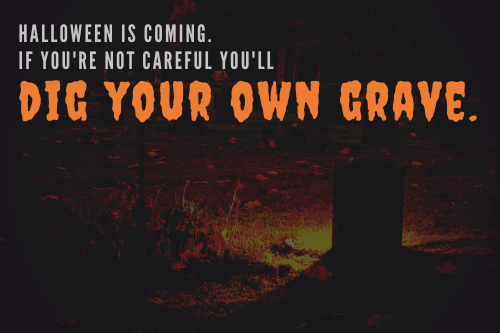
YouTube / iTunes / Spotify / Radio Public / Pocket Casts / Google Podcasts / Breaker / Overcast
Listen to ArtisanEnglish.jp posts & lesson intros here.
English Idiom: Dig your own grave
The countdown has begun. It’s only one week until the big day. There’s something about Halloween that causes people to let loose, do stupid things, and, as a result, dig their own graves.
Until November first, I’ll be featuring a Halloween-themed word, phrase or idiom each day.
My favourite colours are green and orange (good thing I live in Wakayama), and I figured I could have some fun with Halloween this year.
I hope you enjoy the posts.
Over the past few years, the popularity of Halloween has increased in Japan, especially in Shibuya, Tokyo.
Last year, it got rough with sexual assaults, violence and even a mini-truck that was tipped over and danced on by intoxicated people.
You can dig your own grave at any time of year, but it seems especially ghoulish at Halloween.
When you do something foolish or stupid, which gets you into trouble or causes your ruin, you dig your own grave.
Every Halloween, Shibuya becomes a cauldron of young people dressed in Halloween costumes who are hell-bent on becoming their own worst enemies.
When alcohol and a mischievous Halloween spirit are also added to the witchs’ brew, there’s bound to be trouble.
Perhaps now the Japanese understand why drinking alcohol in public is prohibited in North America.
I’ve read that this year, the local Shibuya government has banned the consumption of alcohol on some streets during the Halloween season.
Hopefully, this will save some young people from digging their own graves.
We all know that if you are willing to dig your own grave by doing something stupid, the law will be more than happy to bury you.
Flesch-Kincaid Readability Test
(This post is understandable by someone with at least an 8th-grade education (age 13 – 14).
On the Flesch-Kincaid reading-ease test, this post scores 63.
The higher the score on a scale of 0 – 100, the easier the passage is to read.)

